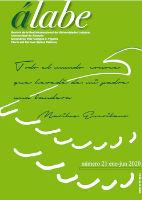
Alabe-Revista de Investigacion sobre Lectura y Escritura
Scope & Guideline
Unlocking the potential of reading and writing research.
Introduction
Aims and Scopes
- Historical and Cultural Studies:
The journal emphasizes the historical evolution of reading and writing practices, particularly in the Spanish-speaking world, analyzing texts from different periods and their cultural contexts. - Linguistic Analysis:
A significant portion of the research is dedicated to examining the linguistic features of various forms of writing, including letters, poetry, and narrative, and how these reflect societal norms and individual identity. - Educational Perspectives:
The journal explores methodologies and pedagogical strategies for teaching reading and writing, focusing on the development of literacy skills in diverse educational settings. - Interdisciplinary Approaches:
Alabe encourages interdisciplinary research that connects literature, linguistics, education, and cultural studies, fostering a holistic understanding of literacy. - Literary Criticism:
It provides a platform for literary analysis and criticism, engaging with contemporary and historical texts to examine themes, structures, and reader responses.
Trending and Emerging
- Digital Literacy and Technology:
There is a growing emphasis on the impact of digital media and technology on reading and writing practices, exploring how these tools reshape literacy in educational contexts. - Ecocritical Perspectives:
Emerging themes in ecocriticism highlight the relationship between literature, nature, and environmental concerns, indicating a trend towards integrating ecological awareness into literary studies. - Intercultural and Multilingual Literacies:
Research focusing on intercultural and multilingual aspects of reading and writing is on the rise, reflecting the globalized nature of contemporary literature and the importance of diverse linguistic backgrounds. - Narrative Identity and Memory:
Papers exploring the intersections of narrative, identity, and memory are becoming more prevalent, showcasing how literature serves as a vehicle for personal and collective memory. - Creative and Collaborative Writing Practices:
There is an increasing interest in creative writing and collaborative writing practices, particularly in educational settings, as a means to engage students and foster literary creativity.
Declining or Waning
- Traditional Literary Forms:
There is a noticeable decline in papers focusing on classical literary forms and traditional narratives, as newer forms of expression and media gain traction. - Single-Author Studies:
Research centered on individual authors has become less frequent, possibly due to a broader interest in collective narratives and diverse voices within literature. - Focus on Print Media:
As digital literacy and online reading practices become more prominent, the focus on traditional print media in literary studies appears to be waning. - Prescriptive Approaches to Literacy:
The journal seems to be moving away from prescriptive methodologies in literacy education, favoring more descriptive and exploratory approaches that consider the complexities of modern literacy. - Gendered Reading Practices:
While gender perspectives have been important, there seems to be a decline in papers specifically addressing gendered reading practices, as discussions increasingly integrate intersectional frameworks.
Similar Journals

READING AND WRITING
Unraveling the Complexities of Language and ThoughtREADING AND WRITING is a premier academic journal dedicated to exploring the interdisciplinary fields of education, linguistics, neuropsychology, and speech and hearing. Published by Springer, this journal has established itself as a leading platform for high-quality research, reflected in its impressive Q1 ranking across various disciplines in the 2023 journal quartiles. Covering significant advancements from its inception in 1989 through to 2024, READING AND WRITING emphasizes the critical interplay between reading and writing skills and their cognitive, linguistic, and educational implications. With its broad scope and commitment to advancing knowledge, this journal is invaluable for researchers, educators, and students aiming to deepen their understanding of literacy development and its impact on learning and communication. Although it operates without an open access model, the journal's rigorous peer-review process assures that published articles meet the highest academic standards, making it a reliable source of novel insights in these interconnected fields.
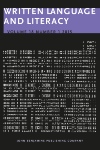
Written Language and Literacy
Exploring the Nexus of Language and LiteracyWritten Language and Literacy is a leading academic journal that has been at the forefront of language and literacy research since its inception in 1998. Published by John Benjamins Publishing Co in the Netherlands, this journal provides a platform for innovative and rigorous studies exploring the intersections of language, literacy, and cognitive processes. With an impressive impact factor and classified in the Q2 category for Linguistics and Language, it offers valuable insights and methodologies that contribute significantly to the field. The journal ranks 498th out of 1088 in Arts and Humanities and 577th out of 1167 in Social Sciences, placing it firmly within the academic conversation on language studies. Though it does not offer open access, it remains highly sought after by researchers, professionals, and students, ensuring a rich collection of knowledge essential for advancing literacy and language practices in diverse contexts.

Etudes Romanes de Brno
Advancing Scholarly Discourse in the HumanitiesEtudes Romanes de Brno, published by Masaryk University, Faculty of Arts, is a distinguished academic journal that has been contributing to the fields of Linguistics and Language as well as Literature and Literary Theory since its inception. With an ISSN of 1803-7399 and E-ISSN 2336-4416, this open-access journal has been a valuable resource for scholars since 2009, enhancing accessibility to a broad audience of researchers and students in the Czech Republic and beyond. The journal's impact is underscored by its categorization in the Q2 and Q3 quartiles for literature and linguistic studies as of 2023, reflecting its commitment to rigorous academic discourse. With Scopus rankings placing it in the 57th and 31st percentiles for its respective fields, it continues to attract high-quality submissions that explore contemporary issues in literary studies and language analysis. Etudes Romanes de Brno promises to remain an essential platform for the exchange of scholarly ideas, fostering growth and innovation in the humanities.

Educacao & Formacao
Advancing Knowledge for a Brighter TomorrowEducacao & Formacao is a pioneering academic journal published by the State University of Ceará within the Centro de Educação, focusing on the fields of education and teacher training. With an E-ISSN of 2448-3583, this journal has embraced the open access model since 2016, ensuring that high-quality research is freely accessible to educators, researchers, and practitioners globally. The journal serves as a vital platform for disseminating innovative research, critical analyses, and best practices in education, particularly within the Brazilian context and beyond. With its commitment to contributing to the discourse on education, Educacao & Formacao encourages submissions that advance knowledge and foster improvements in educational practices. The journal’s focus on accessibility and engagement makes it an invaluable resource for professionals and students eager to stay abreast of current trends and developments in education.

Tejuelo-Didactica de la Lengua y la Literatura
Elevating Language and Literature Studies.Tejuelo-Didactica de la Lengua y la Literatura, published by Junta Extremadura, Consejería Educación, is a prestigious open-access journal based in Spain that has been serving the academic community since its inception in 2008. With a focus on education, linguistics, and music, the journal proudly holds a strong position in the academic landscape, notably ranking in the top quartile (Q1) for both linguistics and music in 2023. Its impressive Scopus rankings further highlight its relevance, showcasing a remarkable 83rd percentile in the field of Arts and Humanities, particularly in Music. As part of the ongoing converged years from 2018 to 2024, Tejuelo aims to foster dialogue among researchers, educators, and practitioners, providing a platform for innovative research and insightful discussions that enhance the understanding and teaching of language and literature. By promoting scholarly exchange through open access, the journal plays a vital role in advancing knowledge and practices in its fields, making it an essential resource for students and professionals alike.

Perinola-Revista de Investigacion Quevediana
Advancing Scholarly Dialogue in Quevedian LiteraturePerinola-Revista de Investigacion Quevediana is a prestigious academic journal dedicated to the exploration and analysis of literature and literary theory. Published by the Universidad de Navarra, Servicio Publicaciones, this journal operates within a vibrant scholarly environment in Spain, fostering critical dialogue and innovative research in the field. With its Q1 ranking in Literature and Literary Theory as of 2023 and a solid position in the Scopus rankings (Rank #410 out of 1106, 62nd percentile), Perinola consistently disseminates high-quality research that engages both seasoned scholars and emerging voices in the discipline. The journal's scope encompasses a variety of literary themes, making it an essential resource for those invested in the nuances of literary study. As an open-access publication, it ensures that groundbreaking scholarship is accessible to a global audience, reinforcing its mission to contribute significantly to the academic community from 2011 through 2024 and beyond.
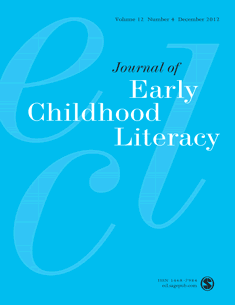
Journal of Early Childhood Literacy
Cultivating a Love for Reading from the StartJournal of Early Childhood Literacy, published by SAGE PUBLICATIONS LTD, is a leading international journal dedicated to the exploration and dissemination of research in the field of early childhood literacy. With a robust impact factor and a distinguished ranking in the Q1 category of Education, this journal is at the forefront of publishing innovative studies and theoretical frameworks that shape literacy practices and policies for young learners. Operating from its base in the United Kingdom, it serves as a crucial platform for researchers, educators, and practitioners alike, providing insights into literacy development, pedagogical strategies, and the socio-cultural contexts affecting literacy acquisition. Researchers can access a wealth of articles that reflect the journal’s commitment to advancing knowledge and understanding in early childhood literacy, making it an essential resource for anyone dedicated to fostering literacy in the formative years. The journal has consistently maintained a strong reputation, ranking in the top 82nd percentile among its peers in Social Sciences - Education according to Scopus metrics. Engage with the vibrant discourse and contribute to the evolving landscape of early literacy by exploring the latest findings published in the Journal of Early Childhood Literacy.
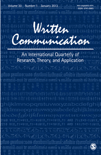
WRITTEN COMMUNICATION
Empowering Voices Through Rigorous ScholarshipWRITTEN COMMUNICATION is a premier interdisciplinary journal published by SAGE Publications Inc, dedicated to advancing the understanding of communication through writing. With a strong reputation in the field, this journal holds an impressive impact factor, reflecting its significant contribution to the realms of both Communication and Literature and Literary Theory, where it proudly ranks in the top quartile (Q1) according to the 2023 category rankings. The journal's rigorous scholarly articles offer insights into the theoretical, practical, and sociocultural dimensions of written communication, making it an essential resource for researchers, professionals, and students alike. With coverage spanning from 1984 to 2024, WRITTEN COMMUNICATION promotes critical discussions and innovative perspectives, shaping the landscape of writing studies. For those interested in exploring the complexities of writing as a communicative act, this journal serves as a vital platform for academic discourse and discovery.
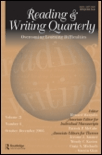
Reading & Writing Quarterly
Illuminating the path to effective literacy instruction.Reading & Writing Quarterly, an esteemed journal published by Routledge Journals, Taylor & Francis Ltd, stands as a pivotal resource in the fields of education and linguistics. Established in 1992, this journal has gained recognition for its rigorous scholarly contributions, reflected in its impressive Q1 ranking in both Education and Linguistics, as well as notable placements in the Scopus rankings (75th and 330th percentiles respectively). With its commitment to advancing research on reading and writing processes, practices, and pedagogy, Reading & Writing Quarterly continues to inform and engage an audience of researchers, educators, and students keen on effective literacy instruction and research. While this journal does not provide open access options, its rich content remains a vital asset for those invested in the evolving landscape of literacy education. Based in the United Kingdom, it is positioned not only as a national treasure but also as a significant contributor to global educational discourse. Explore the insights and research that shape contemporary practices in literacy education through this highly respected publication.
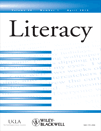
Literacy
Advancing the Dialogue on Literacy EducationLiteracy is a premier academic journal published by Wiley, focusing on critical advancements and research in the fields of education and linguistics. With an impressive impact factor reflected in its Q2 ranking in Education and Q1 in Linguistics and Language, this journal serves as a vital platform for researchers, educators, and students seeking to explore contemporary issues surrounding literacy in diverse contexts. Since its inception in 2005, Literacy has made significant contributions to understanding the evolving nature of literacy practices, promoting dialogue on innovative pedagogies and the sociocultural implications of language use. While it is not an Open Access journal, its accessibility through institutional subscriptions ensures that its valuable insights reach a broad audience. With its robust Scopus rankings, including an 88th percentile in Language and Linguistics and 63rd in Education, Literacy remains an indispensable resource for those committed to advancing literacy education and research.